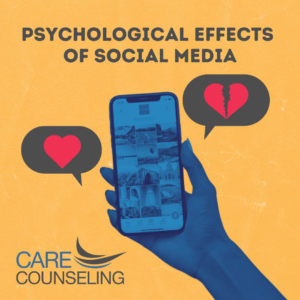Unveiling the Psychological Effects of Social Media
 In today’s digital era, social media has become an integral part of our lives, connecting us with friends, family, and the wider world. However, it’s essential to recognize the potential psychological impacts of this virtual realm. In this blog post, we will delve into the complex relationship between social media and mental health. We will analyze how social media influences our well-being, explore issues such as comparison, cyberbullying, and addictive behaviors, and provide insights on fostering a healthy relationship with these digital platforms.
In today’s digital era, social media has become an integral part of our lives, connecting us with friends, family, and the wider world. However, it’s essential to recognize the potential psychological impacts of this virtual realm. In this blog post, we will delve into the complex relationship between social media and mental health. We will analyze how social media influences our well-being, explore issues such as comparison, cyberbullying, and addictive behaviors, and provide insights on fostering a healthy relationship with these digital platforms.
Social media platforms have the power to shape our thoughts, emotions, and behaviors, thereby influencing our mental health. While it can be a source of connection and support, social media also presents certain challenges. Research suggests that excessive use of social media can contribute to feelings of loneliness, depression, and anxiety. It often leads to unhealthy social comparisons, as we compare our lives to carefully curated highlight reels of others. Additionally, the anonymity and distance provided by social media can foster cyberbullying and online harassment, further exacerbating mental health issues. Moreover, the addictive nature of these platforms can lead to detrimental consequences, as individuals struggle to disconnect and experience adverse effects on their overall well-being.
Social media platforms often provide a breeding ground for social comparison, leading to a negative impact on mental health. People tend to showcase their best moments, accomplishments, and experiences online, which can create a distorted reality. As a result, individuals may develop feelings of inadequacy, low self-esteem, and depression when comparing themselves to others’ seemingly perfect lives. It is essential to recognize that social media often portrays a curated version of reality, and behind the filtered images lie personal struggles and challenges that go unshared. Developing self-awareness and practicing mindfulness can help combat the negative effects of social comparison. Focusing on personal growth, setting realistic expectations, and engaging in activities that foster self-esteem offline are key strategies for maintaining a positive self-image in the age of social media.
The anonymity and perceived distance afforded by social media platforms contribute to the prevalence of cyberbullying and online harassment. These forms of digital aggression can have severe consequences for mental health. Victims of cyberbullying often experience heightened levels of anxiety, depression, and social isolation. It is crucial to address this issue by promoting a culture of respect and empathy online. Encouraging responsible online behavior, educating individuals on the impact of their words, and providing resources for support can help combat cyberbullying. Additionally, developing resilience and fostering strong offline relationships can provide a support system that mitigates the negative effects of online harassment.
Social media platforms are designed to be addictive, keeping users engaged for prolonged periods. The constant need for validation through likes, comments, and followers can create a cycle of dependence and negatively impact mental health. Excessive social media use has been associated with symptoms of anxiety, depression, sleep disturbances, and reduced overall well-being. Breaking free from social media addiction requires conscious efforts. Implementing digital detoxes, setting boundaries around usage, and engaging in offline activities that bring joy and fulfillment are vital steps toward regaining control over our relationship with social media.
Social media has undeniably revolutionized how we connect and share information, but it comes with potential psychological consequences. By understanding the psychological effects of social media, such as comparison, cyberbullying, and addiction, we can approach these platforms more mindfully. Striving for self-awareness, setting healthy boundaries, and seeking support when needed are essential aspects of fostering a positive relationship with social media. Let us harness the benefits while mitigating the potential risks, creating a digital landscape that promotes well-being, authenticity, and genuine connection.



























